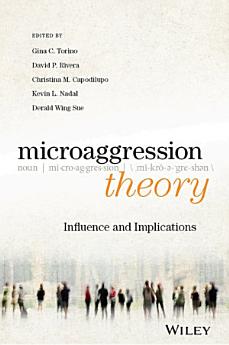Microaggression Theory: Influence and Implications
ഈ ഇ-ബുക്കിനെക്കുറിച്ച്
Microaggressions are brief, everyday exchanges that send denigrating messages to certain individuals because of their group membership (e.g., race, gender, culture, religion, social class, sexual orientation, etc.). These daily, common manifestations of aggression leave many people feeling vulnerable, targeted, angry, and afraid. How has this become such a pervasive part of our social and political rhetoric, and what is the psychology behind it?
In Microaggression Theory, the original research team that created the microaggressions taxonomy, Gina Torino, David Rivera, Christina Capodilupo, Kevin Nadal, and Derald Wing Sue, address these issues head-on in a fascinating work that explores the newest findings of microaggressions in their sociopolitical context. It delves into how the often invisible nature of this phenomenon prevents perpetrators from realizing and confronting their own complicity in creating psychological dilemmas for marginalized groups, and discusses how prejudice, privilege, safe spaces, and cultural appropriation have become themes in our contentious social and political discourse.
- Details the psychological effects of microaggressions in separate chapters covering clinical impact, trauma, related stress syndromes, and the effect on perpetrators
- Examines how microaggressions affect education, employment, health care, and the media
- Explores how social policies and practices can minimize the occurrence and impact of microaggressions in a range of environments
- Investigates how microaggressions relate to larger social movements
If you come across the topic of microaggressions in your day-to-day life, you can keep the conversation going in a productive manner—with research to back it up!
രചയിതാവിനെ കുറിച്ച്
Gina C. Torino, Ph.D., is an Associate Professor of Psychology at SUNY Empire State College in New York.
David P. Rivera, Ph.D., is an Associate Professor of Counselor Education at Queens College, City University of New York.
Christina M. Capodilupo, Ph.D., is an Adjunct Associate Professor in the Department of Counseling and Clinical Psychology at Teachers College, Columbia University.
Kevin L. Nadal, Ph.D., is a Professor of Psychology at John Jay College of Criminal Justice and at The Graduate Center, City University of New York.
Derald Wing Sue, Ph.D., is a Professor of Psychology and Education in the Department of Counseling and Clinical Psychology at Teachers College, Columbia University, where he also holds a joint appointment with the School of Social Work.





